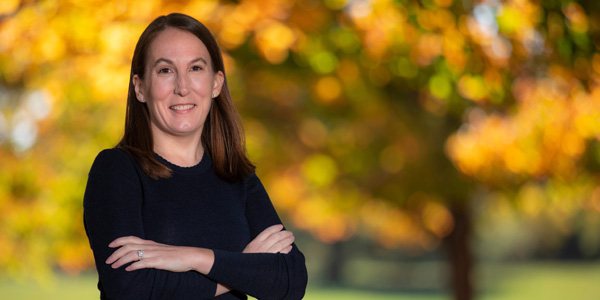
Molding Medical Careers
It was while researching new therapies for metastatic breast cancer at Washington University in St. Louis that Alison Esser (’03 biology, environmental science) realized she enjoyed training, advising and mentoring students. So, she switched from her research scientist role to an advising role that led to her current position at Iowa State University.
Esser, advising coordinator in the genetics, development and cell biology department, joined Iowa State in May 2020. She advises approximately 80 students majoring in genetics and bioinformatics and computational biology. She also teaches two genetics orientation classes and coordinates the genetics and bioinformatics and computational biology learning community.
“I enjoy advising because I can help students achieve their goals,” Esser says. “I have the unique opportunity to interact with students from their initial campus visits through their academic careers and maintain relationships with them as alumni. It’s exciting and I love that our alumni stay involved and contribute to the program through assisting with informational interviews, job shadowing and as speakers on career panels.”
Many of the students she advises have goals of obtaining health-related careers — physicians, genetic counselors and biomedical scientists, to name a few. Esser guides students in selecting appropriate courses to help them achieve their career goals. In her orientation classes, she connects students with alumni who can provide students with insight into health careers.
“The science-oriented curriculum in majors like genetics is a natural fit for students interested in human health,” says Andy Zehr, CALS director of marketing and new student programs. “The biology, chemistry, physics, biochemistry and math courses required for genetics students to graduate are the very same courses most medical schools require for admission.”
Starting her new position mid-pandemic has been “interesting and sometimes challenging,” Esser says. Normally, she would have met her incoming freshmen advisees in person during orientation in June, but those meetings took place virtually.
This semester, Esser has taken a hybrid approach with the learning community, holding both in-person and virtual activities with students.
“She started her job at a very difficult time when she cannot meet most of the people she needed to,” says Yanhai Yin, professor and chair of genetics, development and cell biology.
“Yet she navigated the situation well and started her job effectively. I really appreciate her resilience in learning and doing her important job through the pandemic, which is critical for our teaching mission.”
The Department of Genetics, Development and Cell Biology is administered jointly by the College of Liberal Arts and Sciences and the College of Agriculture and Life Sciences. The department teaches more than 30 courses and participates in three undergraduate programs: genetics; biology; and bioinformatics and computational biology; and seven graduate programs: genetics and genomics; molecular, cellular and developmental biology; plant biology; bioinformatics and computational biology; microbiology; neuroscience; and toxicology.



